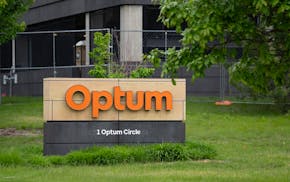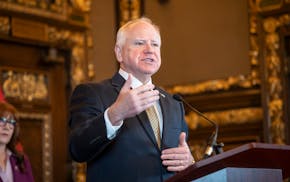Mortgage foreclosures are hovering near historic lows, but a growing number of people are still having trouble paying their mortgages, while an influx of scammers loom to take advantage.
The Minnesota Attorney General's Office recently issued a warning about an uptick in complaints from homeowners promised relief, only to discover it was all a sham.
"I cannot abide scammers targeting anyone in Minnesota, especially people who are already going through financial difficulty," said Attorney General Keith Ellison in a statement. "Unfortunately, that is exactly what mortgage-assistance scammers are doing to folks who are struggling with their mortgages."
Brian Evans, press secretary for the AG's office, said most such cons prey on vulnerable homeowners via unsolicited mailings.
"Being in foreclosure is a matter of public record, and scammers will collect as much public information as they can find on someone to make their scam and their letter look legitimate," he said.
Mortgage foreclosures are still relatively rare and can vary dramatically from month to month. But there are signs more Minnesota homeowners are struggling to keep up with their payments.
ATTOM, a company that tracks mortgage data across the country, said from September to October, the foreclosure rate in Minnesota increased 18.59%. Compared with October 2023, the foreclosure rate was down 9.31%. With one foreclosure per 6,740 housing units during October, Minnesota had the 27th-highest foreclosure rate of the 50 states. The bulk of them were in Hennepin, Ramsey, Dakota and Anoka counties.
Nationwide, there was a slight uptick in foreclosure activity at that time, with 30,784 properties filing for foreclosure, marking about a 4% increase from the previous month but an 11% decrease year-over-year.
Intercontinental Exchange, a real estate technology and data company, reported the rate of delinquency — loan payments that are 30 days or more late but not yet in foreclosure — increased slightly from August to September and were up 5.7% year-over-year.
The group said September was the fourth-consecutive month of annual increases in mortgage delinquencies. Serious delinquencies, those more than 90 days past due, increased nearly 6% to a 16-month high.
Those increases aren't surprising to Gina DeNardo Graf, a homeownership/foreclosure prevention advisor with certification from the U.S. Department of Housing and Urban Development (HUD). She is part of NeighborWorks Home Partners, one of several Twin Cities agencies that offers free professional assistance and advice to homeowners having difficulty paying their mortgages.
The group, which receives copies of the pre-foreclosure notices (PFN) sent to people in the foreclosure process, said last year it received a total of 606 such notices. During the last three months of 2023, it received 185 such notices. There were 299 from October through Dec. 12 this year.
DeNardo Graf said once NeighborWorks receives a PFN, an advisor reaches out to the recipient to offer foreclosure intervention services.
"Every customer has a unique experience as to why they fell behind," she said. "Most of my customers have had a loss of income and on top of that, increased expenses such as property taxes, insurance, association dues and assessments, groceries and child care. Some of our customers come to us shortly after they lost their job or they lost their job and have used most of their savings. Some who lost their job could not find a new job that paid as well. Some who had a loss of income due to having medical issues themselves or a family member had medical issues, and they had to take unpaid time off."
She noted with home prices rising and incomes not keeping up, more people are having to spend in excess of 30% of their income on housing expenses.
"Their budgets don't have much flexibility, and they are not able to save to help with income changes," she said.
Parker Maertz, manager of the consumer action division at the AG's office, attributed recent increases in mortgage woes in part to the expiration of pandemic-era financial assistance programs.
Typical scams, per Maertz, start with a letter promising mortgage debt relief in exchange for an up-front payment.
"They say, 'Pay your mortgage funds to us, and we will work with the mortgage lender to secure a better rate,'" he said. "Asking for money up front is by far the biggest red flag. Any reputable foreclosure-assistance organization is not going to charge up-front fees."
Another common ploy comes with a promise of a "forensic audit," meaning scouring mortgage documents in hopes of finding errors that will void the terms of the mortgage or enable renegotiating more favorable terms.
"They aren't real companies," he said. "They get a website, and it usually looks pretty good, and on the site, they don't have any real info because the company doesn't exist."
He said state law prohibits "foreclosure consultants" from collecting a fee until after providing a service.
Bill Gray, stakeholder relations director at the Minnesota Homeownership Center, said the center and its affiliates offer free services.
"You should never pay for foreclosure-prevention help," he said.
Since 2008, he said the Center has helped to prevent more than 40,000 foreclosures across Minnesota, noting 95% of the households working with the center successfully avoid foreclosure.
The AG's office said homeowners who are having trouble staying current on their bills should immediately contact their mortgage lender or servicer to ask what options there are before falling behind too far.
Gray encouraged homeowners to contact a nonprofit organization that provides free mortgage assistance, like:
- A Minneapolis field office for HUD, 612-370-3000 or hud.gov/states/minnesota#LocalOffice
- Minnesota Housing, 651-296-7608, 888-657-3769 or www.mnhousing.gov
- The Minnesota Homeownership Center, 651-659-9336, 866-462-6466 or www.hocmn.org
- Lutheran Social Services Financial Counseling, 218-529-2227, 888-577-2227 or www.issmn.org/housing-counseling
To report a scam, call the Attorney General's Office at 651-296-3353 or 800-657-3787.

Delta hiked fares for solo travelers, until Twin Cities travel experts caught the change

In first speech back, UnitedHealth's new CEO pledges to review hot-button issues

A child had measles at Mall of America, concerning state health officials who don't know source

Ramstad: Gov. Walz, things are not getting done in Minnesota

